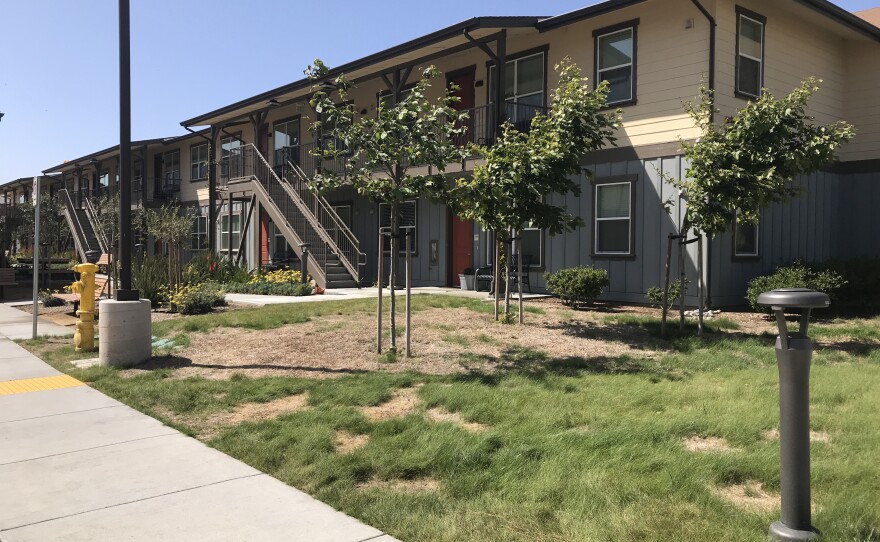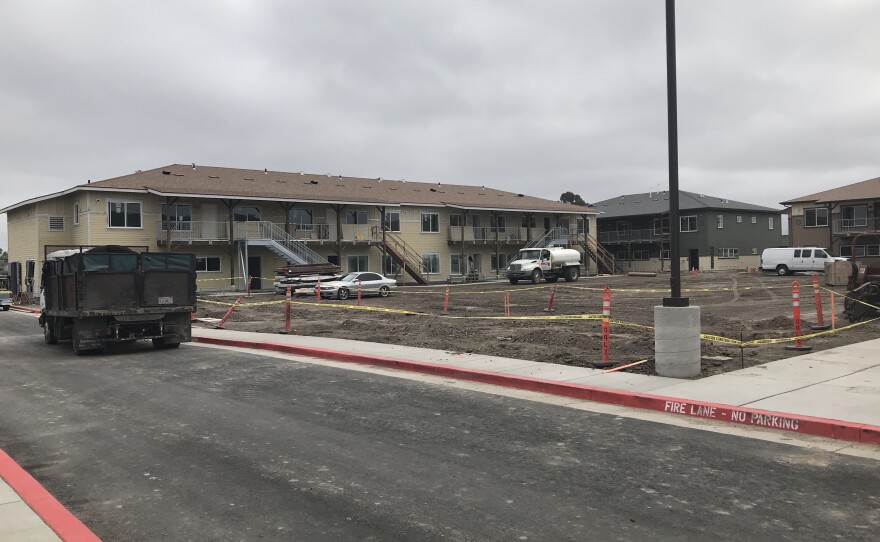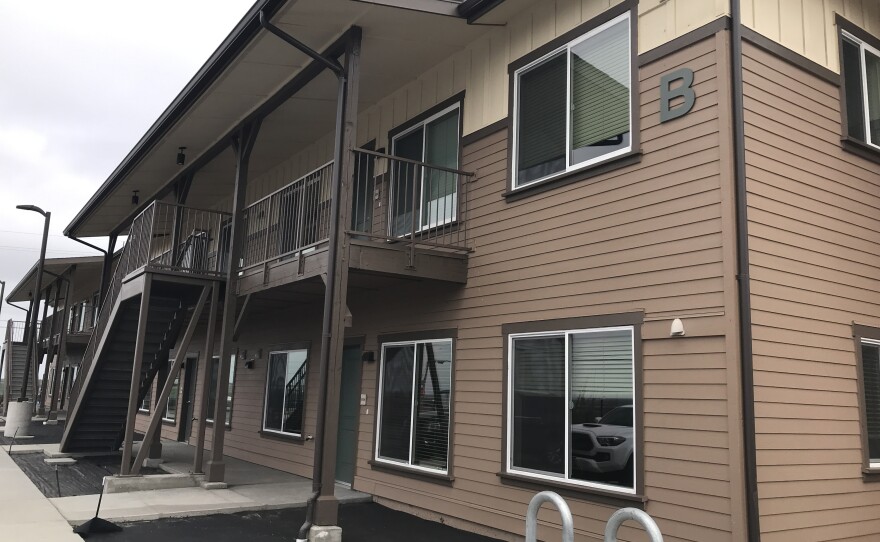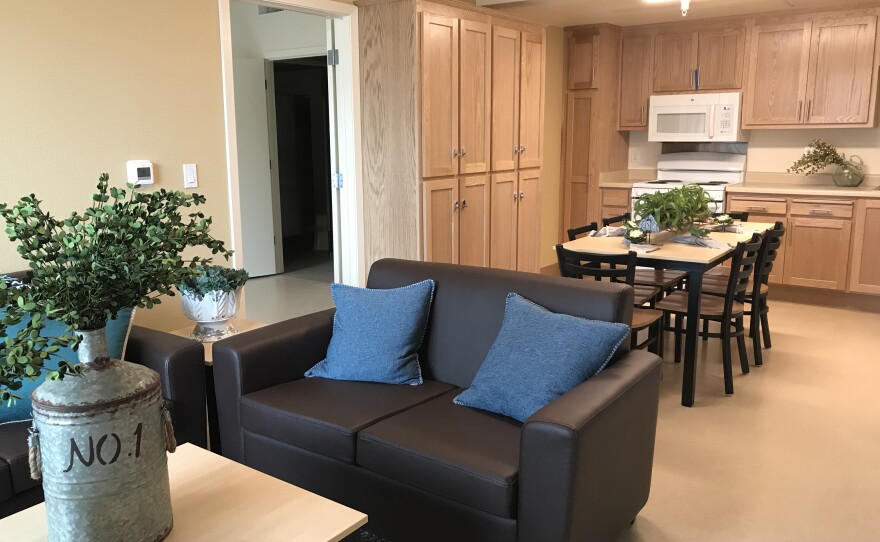Farmworker housing is in crisis. There’s not enough of it and much of what’s available is lousy. A growing number of agriculture companies are building seasonal housing for their workers. But that has it challenges.
Claudia Espindola picks and packages artisan romaine lettuce for a living. After hours of harvesting in the hot sun, she relaxes into a comfy couch. Her hair is pulled into a ponytail under a black baseball cap. It has a “Marine Corps” logo on it. Her son is a Marine.
Espindola has worked in the fields for 27 years to support her kids.
“I'm working in the field when I was 18 years. So, so many years,” she says.
They call Arizona home. But for eight months out of the year, she comes to the Salinas Valley to harvest romaine. Finding a place to live here has always been tough. Recently, she lived in a two-bedroom house with 13 other people. Some people were sleeping in the garage.
“One time I wait for four hours to take my shower because the shower is busy all the… all day,” Espindola says.
She says the kitchen would get so crowded that she’d wake up at three in the morning to make her lunch. Her rent was $500 a month in rent.
Today, her living situation is a lot better. The couch she’s sitting on happens to be in a community store at her new apartment complex. The complex is owned by her employer, Tanimura and Antle. Her rent is now $250 a month.
“I feel so lucky and I feel so blessed to live in this place.”
Employer-built farmworker housing is not a new idea. Back in the 50s and 60s it was common for growers to provide housing. Just ask Monterey County Supervisor Simon Salinas. He comes from a large agriculture family. While Texas was home, the family would travel to California to harvest lettuce and strawberries.
"The growers would provide us housing. So we never had to worry about finding a place to live because the housing would be here from March to October, November. So we came, did the harvest, and then went back home. But sooner or later, the regualtions started becoming too burdensome, so they [growers] started getting away from providing labor camps and housing," Salinas say.
This idea was resurrected by Tanimura & Antle in 2016. That’s when the company opened the 800-bed apartment complex in Spreckels.
Now, other companies are following suit. Ocean Mist Farms is working on a similar project. And the Nunes Company just opened a 600-bed farmworker housing complex. Called “Boronda Villas,” it’s located in Monterey County’s Boronda Neighborhood. Tom Nunes strolls through the center of the complex.
“You can see there’s a basketball court with more seating areas, barbeque pits. On the far side, on the west, there’s a little bit of a walking path. And so it’s kind of a nice, cozy kind of environment for a community of people that are working hard day in and day out,” says Nunes.
The Nunes family and two other ag families, the Rodriguez and Hibino families, invested in this to attract and retain their workforce. The three families grow, harvest and ship under the Foxy Brand. Nunes is glad to be part of the solution, but says this project wasn’t easy.
“It's a cumbersome process. It took us nearly two years to get to the point that we're sitting here today,” says Nunes.
Nunes Company General Counsel Brett Harrell says for more housing like this to happen, there needs to be less red tape. Right now, Monterey County has certain areas zoned for farmworker housing: farmland, permanent grazing and rural grazing zoning districts. But if ag companies want to build outside of those zones, like the Nunes Company did, there’s no specific permit.
“It is not exactly an apartment complex. It's not exactly a year round facility. It's a seasonal agricultural employment and employee facility,” Harrell says.
Because Boronda Villas was essentially classified as an apartment complex, Harrell says they had to build two parking spots per unit. Many of those spots will go unused. The Nunes Company buses its employees to work.
For Harrell, another big problem is the impact fees. These are fees developers pay to offset any impacts to public property, such as wear and tear on the roads.
In fact, the Nunes Company is suing the Salinas Union High School District over its fee. Superintendent Dan Burns said via email the District will not comment on the lawsuit as litigation is pending. Harrell says paying the fee doesn’t make sense because no children live at Boronda Villas.
“I'd like to see a unified set of rules that truly addresses what we're doing here,” says Harrell.
It’s something Monterey County supervisors are working toward; the county wants to encourage these types of projects. Supervisor Luis Alejo recently created a committe tasked with making it easier for ag companies to build employee housing.
"And I'd like to remind local residents, when you talk about farmworker housing, we talk about something that benefits all people. Because when we're building additional farmworker housing, those thousands of workers are no longer competing with the rest of the apartments and houses for rent that are on the market," says Alejo.
The committe will begin meeting this summer. Alejo says the plan is to offer recommendations to the county early next year.







